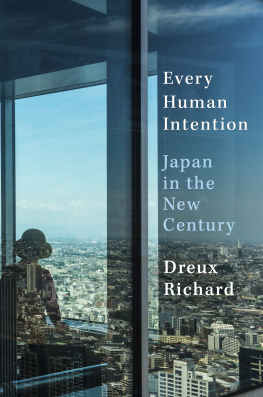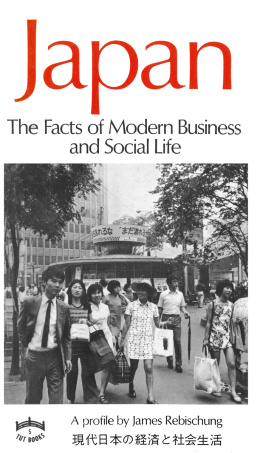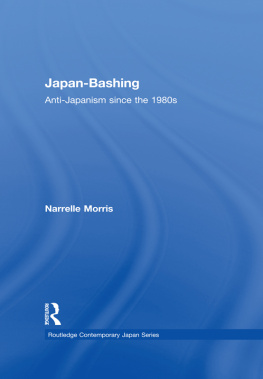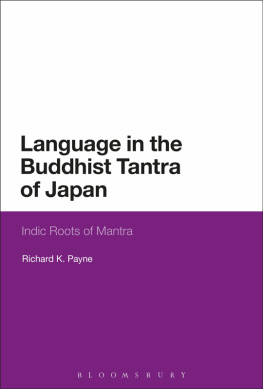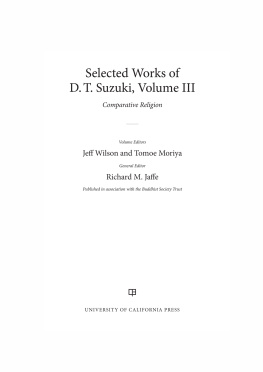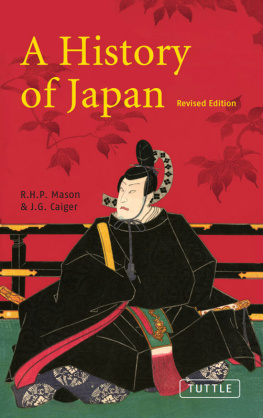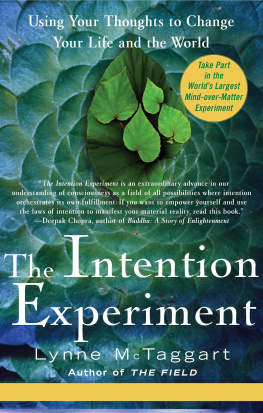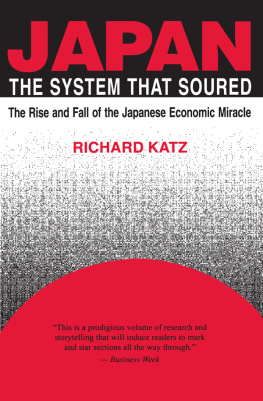Dreux Richard - Every Human Intention: Japan in the New Century
Here you can read online Dreux Richard - Every Human Intention: Japan in the New Century full text of the book (entire story) in english for free. Download pdf and epub, get meaning, cover and reviews about this ebook. year: 2021, publisher: Knopf Doubleday Publishing Group, genre: Detective and thriller. Description of the work, (preface) as well as reviews are available. Best literature library LitArk.com created for fans of good reading and offers a wide selection of genres:
Romance novel
Science fiction
Adventure
Detective
Science
History
Home and family
Prose
Art
Politics
Computer
Non-fiction
Religion
Business
Children
Humor
Choose a favorite category and find really read worthwhile books. Enjoy immersion in the world of imagination, feel the emotions of the characters or learn something new for yourself, make an fascinating discovery.
- Book:Every Human Intention: Japan in the New Century
- Author:
- Publisher:Knopf Doubleday Publishing Group
- Genre:
- Year:2021
- Rating:5 / 5
- Favourites:Add to favourites
- Your mark:
- 100
- 1
- 2
- 3
- 4
- 5
Every Human Intention: Japan in the New Century: summary, description and annotation
We offer to read an annotation, description, summary or preface (depends on what the author of the book "Every Human Intention: Japan in the New Century" wrote himself). If you haven't found the necessary information about the book — write in the comments, we will try to find it.
Every Human Intention: Japan in the New Century — read online for free the complete book (whole text) full work
Below is the text of the book, divided by pages. System saving the place of the last page read, allows you to conveniently read the book "Every Human Intention: Japan in the New Century" online for free, without having to search again every time where you left off. Put a bookmark, and you can go to the page where you finished reading at any time.
Font size:
Interval:
Bookmark:
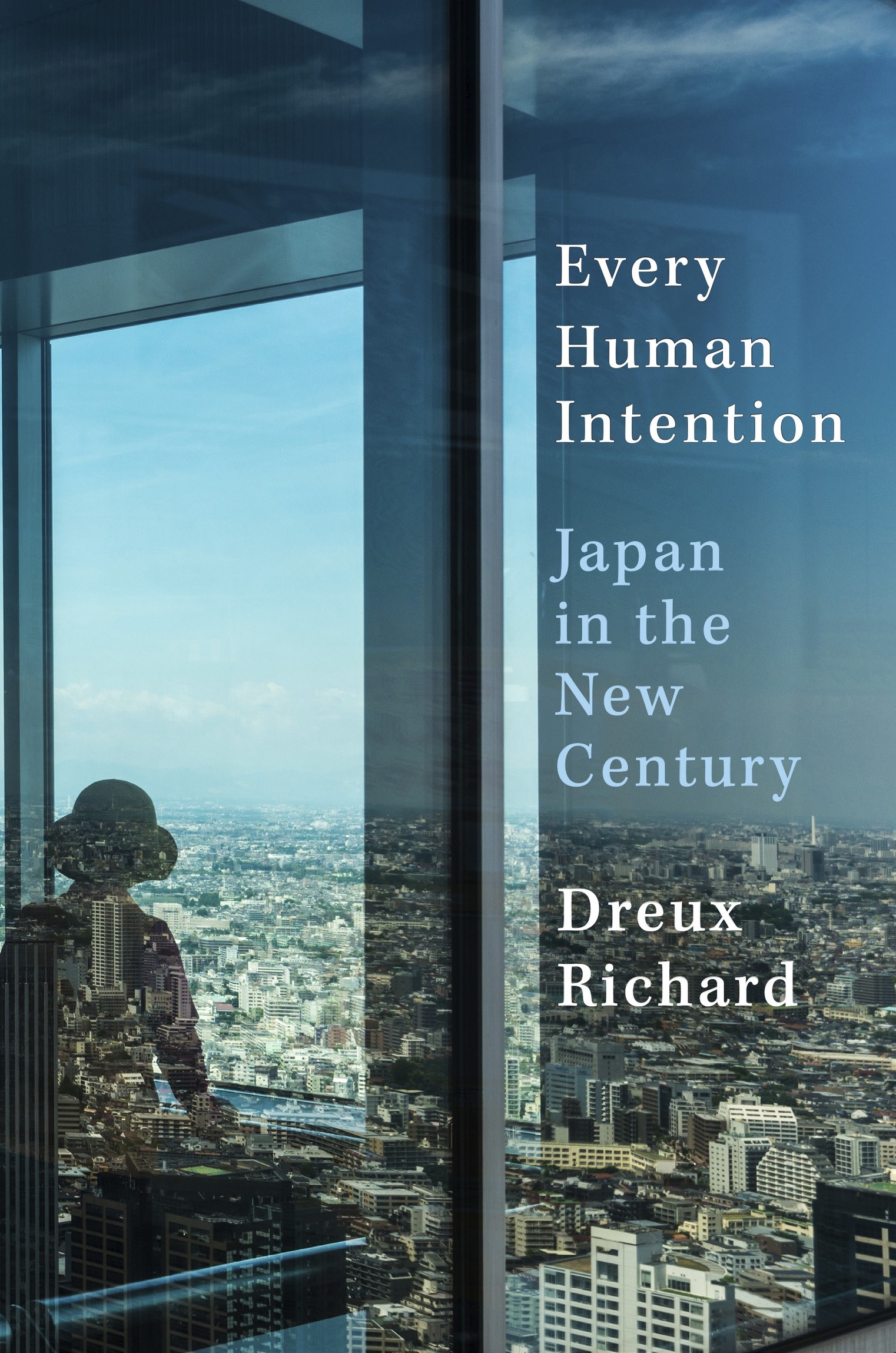
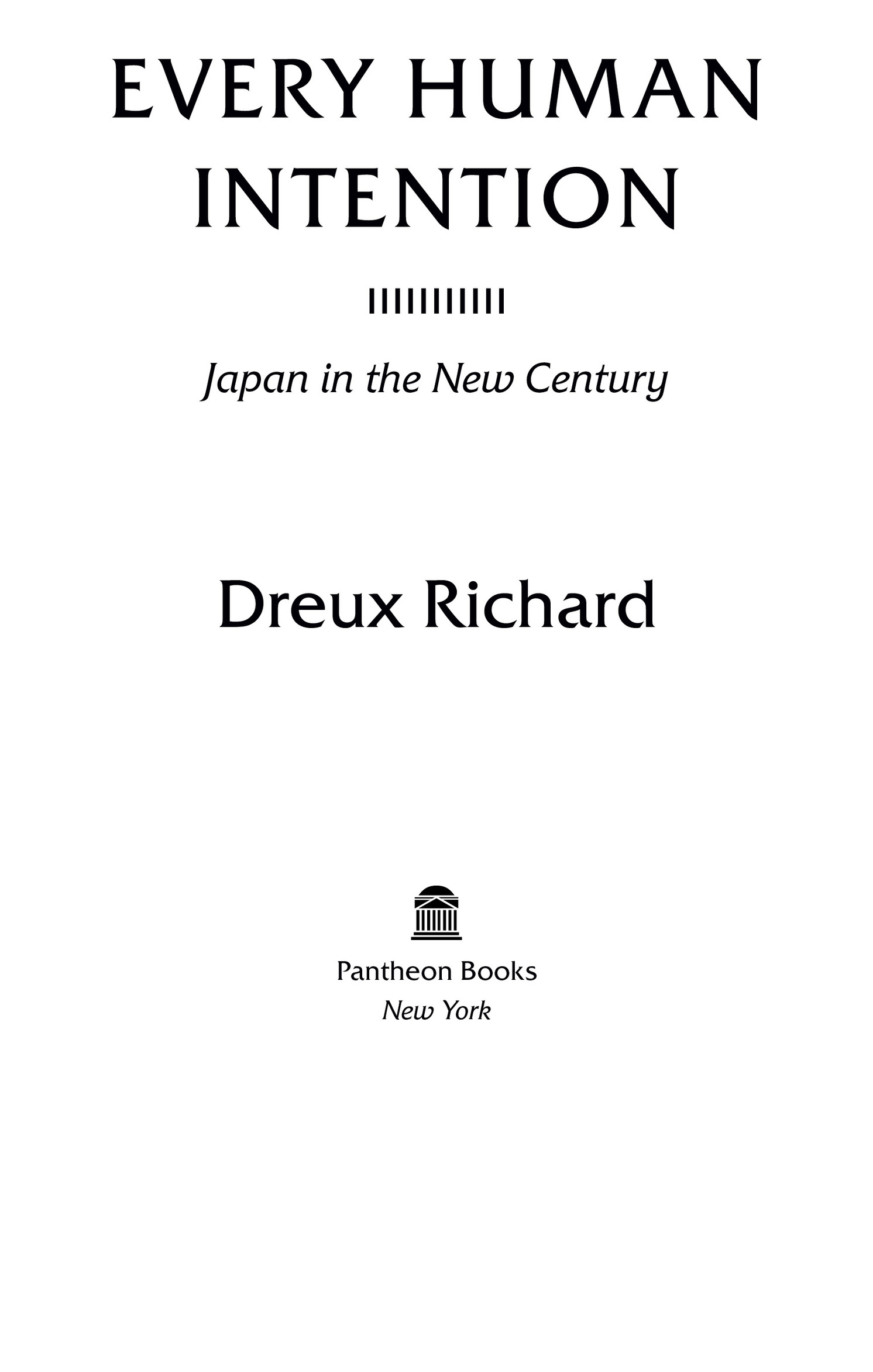
This is a work of nonfiction, but the names of certain individuals as well as identifying descriptive details concerning them have been changed to protect their privacy.
Copyright 2021 by Dreux Richard
All rights reserved. Published in the United States by Pantheon Books, a division of Penguin Random House LLC, New York, and distributed in Canada by Penguin Random House Canada Limited, Toronto.
Pantheon Books and colophon are registered trademarks of Penguin Random House LLC.
Library of Congress Cataloging-in-Publication Data
Name: Richard, Dreux, author.
Title: Every human intention : Japan in the new century / Dreux Richard.
Description: First edition. New York : Pantheon Books, 2021.
Identifiers: LCCN 2020027141 (print). LCCN 2020027142 (ebook). ISBN 9781101871119 (hardcover). ISBN 9781101871126 (ebook).
Subjects: LCSH: NigeriansJapanSocial conditions. Nuclear industrySocial aspectsJapan. JapanHistoryHeisei period, 1989 . JapanSocial conditions1989 . JapanEmigration and immigrationGovernment policy. JapanPopulation policy.
Classification: LCC DS832.7.N54 R53 2021 (print) | LCC DS832.7.N54 (ebook) | DDC 305.896/69052dc23
LC record available at lccn.loc.gov/2020027141
LC ebook record available at lccn.loc.gov/2020027142
Ebook ISBN9781101871126
www.pantheonbooks.com
Cover photograph by Warchi/E+/Getty Images
Cover design by Emily Mahon
Map by Mapping Specialists
ep_prh_5.6.1_c0_r0
For Laura Macklin,
my mother
for Charles Macklin,
her father
and for William Macklin,
his brother
The history of unattached American intellectuals expatriating to Japan is long, particularly crowded after World War II, and many of the resulting books are only as relevant as the era of Japanese economic ascendancy that inspired them. Americans read about East Asia when they are afraid, and now China frightens them more.
Another category of book has endured better: the prose left behind by expatriate literary interlopers of the same era, mostly men (many of them quietly homosexual) and a smaller number of women whose oeuvre is divided between the canon of modern Japanese literature they translated into English and their written reflections on the lives they led in the process. In the 1970s, Donald Richies autobiographical novels established a global audience for this groups experiences. Since his death in 2013, his literary epitaph praises his lyrical observations of life between cultures, where he was, in his own words, a citizen of Limbo, this most attractive, intensely democratic republic.
My mentor in Japan was Hideo Levy, the first Westerner (American, culturally Jewish) to abandon the comforts of Limbo by succeeding as a literary fiction writer in the Japanese language. Before his books won prizes, there was no such thing as Japanese literature. There was only Japan literature and its suggestion of an indispensable connection between language, ethnicity, and nation. Some would rather it remain so, and havent anything nice to say about so-called border-crossing writers like Levy and his Korean contemporaries, the label itself a pejorative nod toward the illicit act of fence hopping.
In his former life as a scholar of Japanese poetics, Levys first student was a woman three years his senior, born in occupied Japan to an American father and a Japanese mother. Her name was Norma Field. In 1989 she wrote In the Realm of a Dying Emperor, a book that made it possible for English-language writing to change Japans politics and culture; previous generations of expatriate writers had been content to interpret and analyze.
Field wrote about three people, call them dissenters. They had in common their respective decisions to ruffle the ornate curtain obscuring the recent death of Emperor Hirohito, even if that meant speaking candidly about his executive role in prolonging Japans wartime agonies. Two were private citizens, whose acts of protest attracted media attention and exposed them to violent harassment from right-wing militants. The third, Nagasakis mayor, was shot through the chest by one of these militants, at city hall.
When Hirohito died in 1989, a growing minority of Japanese economists were nervous about the nations asset price bubble, but they were yet a minority. To call attention to the psychic and social costs of Japans postwar achievementsto oppose the solidity of everyday life in a successful society, as Field put itwas not merely impolite. It was regarded as willfully wrongheaded. In 1991, the year Fields book was published, asset prices collapsed, plunging Japan into an economic purgatory that was labeled the Lost Decade and lasted much longer than ten years. The dissenting voices in Fields book suddenly seemed prescient.
When I arrived in Japan, three months before the Fukushima disaster, the chronologically acute anxiety of the Lost Decade had been replaced by a more diffuse and enduring economic malaise, this time as a function of demographics, which point to a dramatic decline in Japans population: from 128 million in 2010 to 97 million in 2050. In Wakkanai (Japans northernmost city, where much of this book was written), closures of schools, medical facilities, and local businesses tell an old story, distinct in its details but not its theme: Throughout Japan, youth is scarce.
Increased immigration presents a remedy, but it would need to occur on a large scale. Economists estimate the Japanese workforce will require an infusion of roughly 33 million workers. Immigration remains unpopular, eliminating political incentives for comprehensive reform. In 2014, Japans chief cabinet secretary, Suga Yoshihide, declined to comment on reports that the prime minister was considering plans to admit an additional 200,000 immigrants on an annual basis. The administrations intentions eluded the press until 2018, when a reform bill was rushed through parliament, circumventing the normal vetting process. Elements of the law were borrowed from Japans existing guest worker program, faulted for its facilitation of human trafficking by the U.S. Department of State.
In public discourse about the nations economy, hopeor despair, depending on ones politicsattaches to the achievements of Japans longest-serving prime minister, Abe Shinzo, whose aggressive reforms generated a recurring cycle of skepticism and praise from ambivalent economists. Japanese voters have developed the accurate impression that they are inhabiting an economic experiment, founded on a controversial hypothesis. Abe left office in September 2020, but his policies will predominate until late 2021, when the continuity cabinet installed by Suga, Abes handpicked successor, will be forced to consolidate power or relinquish it.
For the past decade, the question that has been posed to Japans body politic most directly is the question of domestic nuclear energy production. Before the multiple meltdown disaster at Fukushima, Japan ran fifty-four commercial nuclear reactors, accounting for one-third of the nations energy. In 2020, eight were operating.
Even in prefectures where the nuclear industry has been responsible for a significant share of economic activity, Japanese voters want to divest from nuclear power. Japan is a nation where antinuclear partisans can build a compelling narrative that begins with the bombing of Hiroshima and Nagasaki, includes the irradiation of a Japanese fishing vessel during nuclear bomb testing at Bikini Atoll, and leads inevitably to the Fukushima disaster on March 11, 2011, which occurred in one of Japans poorest regions because these were the regions where nuclear utilities had been able to create the political possibility of siting several reactors.
Font size:
Interval:
Bookmark:
Similar books «Every Human Intention: Japan in the New Century»
Look at similar books to Every Human Intention: Japan in the New Century. We have selected literature similar in name and meaning in the hope of providing readers with more options to find new, interesting, not yet read works.
Discussion, reviews of the book Every Human Intention: Japan in the New Century and just readers' own opinions. Leave your comments, write what you think about the work, its meaning or the main characters. Specify what exactly you liked and what you didn't like, and why you think so.

